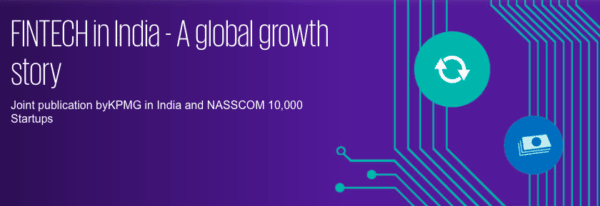 KPMG and NASSCOM 10,000 Startups just released the new report Fintech in India, targeting key elements that are “creating transformational waves across the financial ecosystem in India” and have seen extensive usage across financial service institutions. Topics include essential themes to the fintech ecosystem such as next-generation payments, financial inclusion, P2P lending, robo advisory, Bank in a Box, security and biometrics and blockchain.
KPMG and NASSCOM 10,000 Startups just released the new report Fintech in India, targeting key elements that are “creating transformational waves across the financial ecosystem in India” and have seen extensive usage across financial service institutions. Topics include essential themes to the fintech ecosystem such as next-generation payments, financial inclusion, P2P lending, robo advisory, Bank in a Box, security and biometrics and blockchain.
“The year 2015 was a formative year for the Indian fintech sector, which saw the emergence of numerous fintech start-ups, incubators and investments from public and private investors. It was clearly reflected that a right mix of technical skills, capital investments, government policies, regulatory framework and entrepreneurial and innovative mind-set could be the driving force to establish fintech as a key enabler for financial services in India,” noted co-authors of the report, KPMG Fintech Partner Neha Punater and NASSCOM 10,000 Partnerships Head Vidhya Shankar. “Startups Building a robust fintech ecosystem where start-up firms engage in external partnerships with financial institutions, universities and research institutions, technology experts and government agencies is expected to be a key enabler for growth and innovation in the fintech sector.”
 Fintech has evolved around the globe, the report not only highlights leading practices globally (using markets in the UK, US, Australia, Singapore, China and Israel as a yardstick of fintech evolution for the study) but serves as a guide to strengthen India’s position in the global fintech landscape. According to the report, he Indian fintech software market is forecasted to touch USD 2.4 billion by 2020 from a current USD 1.2 billion01.
Fintech has evolved around the globe, the report not only highlights leading practices globally (using markets in the UK, US, Australia, Singapore, China and Israel as a yardstick of fintech evolution for the study) but serves as a guide to strengthen India’s position in the global fintech landscape. According to the report, he Indian fintech software market is forecasted to touch USD 2.4 billion by 2020 from a current USD 1.2 billion01.
“The prima-facie catalyst for the success of the fintech industry is the Centre. The multi-pronged approach towards enabling higher penetration of these digital financial platforms for institutions as well as the public, is commendable,” observed Naresh Makhijani, Partner and Head (Financial Services), KPMG in India. “The roadblocks of low technological and digital infrastructure, coupled with the lack of authentic consumer information, can be overcome through continuing government incentives, regulatory mandates, and a robust business environment.”
The traditionally cash-driven Indian economy has responded well to the fintech opportunity, primarily triggered by a surge in e-commerce, and smartphone penetration. According to the report, the transaction value for the Indian fintech sector is estimated to be approximately USD 33 billion in 2016 and is forecasted to reach USD 73 billion02 in 2020 growing at a five-year CAGR of 22 per cent. Investor attention has been concentrated towards hi- tech cities in 2015, with Bengaluru witnessing eleven VC-backed investment deals of USD 57 million03, followed by Mumbai and Gurgaon with nine and six deals, cited the report. Bengaluru, the start-up capital of India has benefitted from the same, and is ranked 15 among the world’s major start-up cities.
To read the full report, click here.

